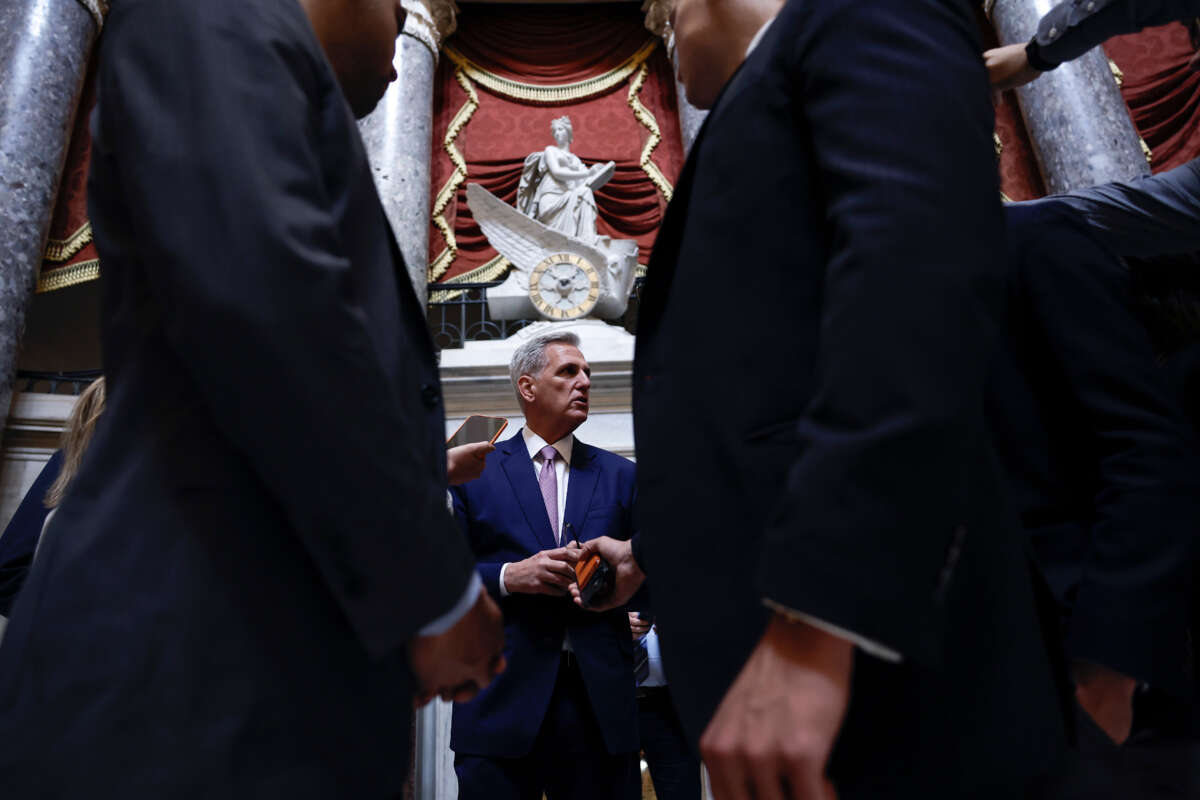Honest, paywall-free news is rare. Please support our boldly independent journalism with a donation of any size.
After spending months threatening to tank the economy over the federal deficit, Republicans have unveiled a set of new tax proposals that would cost the government billions of dollars — by handing tens of billions of dollars of tax cuts to the richest 1 percent of Americans, as a new report reveals.
On Friday, just a week after the conclusion of the debt ceiling showdown, House Republicans released a plan that would slash taxes for corporations and the wealthy, with a forecasted cost to the government of $240 billion over the next decade.
According to a new analysis from the Institute on Taxation and Economic Policy (ITEP), the majority of these cuts would go to the richest 20 percent of Americans.
In 2024 alone, the richest 20 percent of Americans would see an estimated $61 billion in tax breaks. This is not only 43 times the tax cuts for the bottom 20 percent, who would save a mere $1.4 billion, but also more than the tax savings of the entire rest of the country, with the bottom 80 percent seeing $34 billion in cuts in total.
The richest 1 percent would be the largest beneficiaries of all, ITEP found, receiving over $28 billion in tax cuts just next year.
This means that the average tax cut for a person in the top 1 percent — with an average income of $2.5 million — would be $16,550.
The average tax cut for someone in the bottom 20 percent — a group with an average income of $13,800 — would be $40.
The bill “looks like a terrible deal for ordinary Americans and a windfall for foreign investors and the richest 1 percent of Americans,” said report author and ITEP director of federal policy Steve Wamhoff.
Even beyond the policy implications of cutting public funds, Republicans’ proposal comes with an important caveat: the party wants to offset about $216 billion of the costs by repealing tax credits for investments and production of clean energy, while also getting rid of a tax on dumping on toxic chemical dumping sites.
In other words, Republicans are seeking to fund their major tax cut plan by boosting the fossil fuel industry and harming the climate. Further, if this is the only plan to offset the tax cuts, the plan would still pile billions of dollars onto the deficit.
And, as ITEP notes, while the proposal would technically only enact the largest tax cuts for the next two years, the bill’s proponents are planning to make these cuts permanent — which the Committee for a Responsible Federal Budget has said would cost the government $1 trillion in revenue over the next decade.
Democrats have blasted the plan, saying that it only represents Republicans’ latest attempt to hand tax breaks to their wealthy benefactors while sapping public resources away from the rest of the public.
“With the predictability of a metronome, Republicans are back doing what they do best: pushing tax giveaways that benefit the wealthy, the large, huge corporations, while telling working families to take a hike,” said Senate Majority Leader Chuck Schumer (D-New York) in remarks on the Senate floor on Monday.
In a hearing last week, Rep. Richard Neal (D-Massachusetts), top Democrat on the Ways and Means Committee, pointed out that it took Republicans just days after the debt ceiling crisis to propose billions in tax cuts. “Not even a week after their manufactured default crisis and it is back to tax cuts for the wealthy and well-connected,” said Neal.
Press freedom is under attack
As Trump cracks down on political speech, independent media is increasingly necessary.
Truthout produces reporting you won’t see in the mainstream: journalism from the frontlines of global conflict, interviews with grassroots movement leaders, high-quality legal analysis and more.
Our work is possible thanks to reader support. Help Truthout catalyze change and social justice — make a tax-deductible monthly or one-time donation today.
